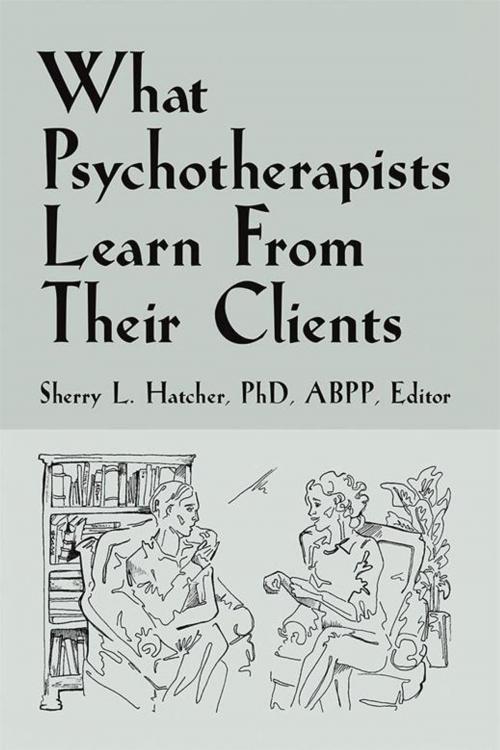What Psychotherapists Learn from Their Clients
Nonfiction, Health & Well Being, Psychology, Psychotherapy| Author: | Sherry L. Hatcher PhD ABPP | ISBN: | 9781503513594 |
| Publisher: | Xlibris US | Publication: | November 7, 2014 |
| Imprint: | Xlibris US | Language: | English |
| Author: | Sherry L. Hatcher PhD ABPP |
| ISBN: | 9781503513594 |
| Publisher: | Xlibris US |
| Publication: | November 7, 2014 |
| Imprint: | Xlibris US |
| Language: | English |
What Psychotherapists Learnfrom Their Clients
Sherry L. Hatcher, PhD, ABPP, Editor
"How I wish I'd had the benefit of What Psychotherapists Learn from Their Clients several decades ago. This book illuminates a seldom discussed but crucial area of the treatment relationship. The popular notion, held by patients and clinicians alike, is that the therapist is there to "treat" the patient. S/he is the expert, the seer holding all the answers, the keys to the basement, and the combination to the vault where all the secrets are kept. Embedded in this way of thinking is also something of a pretense that, because the psychotherapist is present in the role of clinician, s/he is notinvolved in the process and certainly not affected by the client other thanin a countertransferential manner. Perhaps the traditional focus in ourtraining-that therapy is not a social relationship, that boundaries are anessential and ethical part of practice, and that we must learn and adhere to role-appropriate behavior-results in our learning to avoid an awarenessof our patients' influence on us, and of what we learn from them, not justabout them. Largely hidden from this perspective is the fact that one ofthe operative terms in the idea of the treatment relationship is relationship.The therapist is 50 percent of the dyad, fully one half of the enterprise.And among psychotherapists, it is a widely known secret that being in theprivileged position of learning about the private struggles, secret tormentsand desires, and fundamental heartbreaks of other human beings affectsus deeply and throughout our lives."
- Margaret Cramer, PhD, ABPP
What Psychotherapists Learnfrom Their Clients
Sherry L. Hatcher, PhD, ABPP, Editor
"How I wish I'd had the benefit of What Psychotherapists Learn from Their Clients several decades ago. This book illuminates a seldom discussed but crucial area of the treatment relationship. The popular notion, held by patients and clinicians alike, is that the therapist is there to "treat" the patient. S/he is the expert, the seer holding all the answers, the keys to the basement, and the combination to the vault where all the secrets are kept. Embedded in this way of thinking is also something of a pretense that, because the psychotherapist is present in the role of clinician, s/he is notinvolved in the process and certainly not affected by the client other thanin a countertransferential manner. Perhaps the traditional focus in ourtraining-that therapy is not a social relationship, that boundaries are anessential and ethical part of practice, and that we must learn and adhere to role-appropriate behavior-results in our learning to avoid an awarenessof our patients' influence on us, and of what we learn from them, not justabout them. Largely hidden from this perspective is the fact that one ofthe operative terms in the idea of the treatment relationship is relationship.The therapist is 50 percent of the dyad, fully one half of the enterprise.And among psychotherapists, it is a widely known secret that being in theprivileged position of learning about the private struggles, secret tormentsand desires, and fundamental heartbreaks of other human beings affectsus deeply and throughout our lives."
- Margaret Cramer, PhD, ABPP















